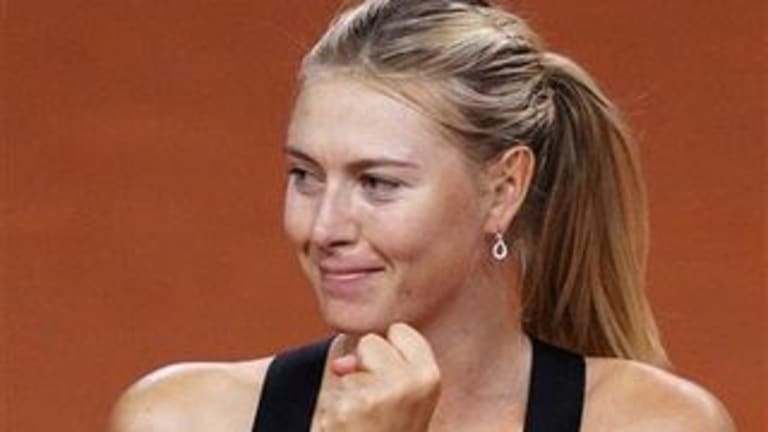When you think of Maria Sharapova, you don't think of the word "consistent"—at least I don't, after watching her serve fall apart and her groundstrokes find the net so many times despite so much success in her career. She lives on the edge, much like her opponent in the second Stuttgart semifinal, Petra Kvitova. But the veteran—another word I don't like to associate with the 25-year-old—was a model of consistency in a 6-4, 7-6 (3) win, taking a match that could easily be in a third set as of this writing.
Sharapova was consistent with her backhand all day, which played a large part in the result. She struck it forcefully, accurately, and took what Kvitova gave her, which was plenty. The Czech's forehand was a tale of two types of shot: Her down-the-line variety was effective, but when Kvitova went cross-court and struck it with more spin, Sharapova feasted on it. It put constant pressure on Kvitova, who wasn't sharp to begin with. The world No. 3 gave Sharapova three break chances when serving at 2-2 in the first set, and though she saved them all, a fourth was too much to handle. Sharapova rode the break advantage to the set, thanks to her own fine play and a rash of Kvitova return misses.
It was Sharapova's turn to offer Kvitova chances for advancement in the second set—by the sixth game, the Russian was serving to save her fourth and fifth break points. Which she did, yet two games later, Kvitova, leading 4-3, earned break points six and seven. But the same undoings that plagued Kvitova in the first set resurfaced when she had break chances in the second. When she got a racquet on her return—a rarity—she did not play the pivotal points well. Sharapova, by contrast, played some of her boldest tennis in the second set when the pressure was at its peak. She wiped away both break chances to hold for 4-4.
Up 5-4, Kvitova earned her ninth break point of the set—a set point—and this time she played it well, forcing a short Sharapova reply with an aggressive forehand. It was arguably Kvitova's best cross-court forehand of the match. She followed it with her worst, coming in and bungling a ball destined for the open court just wide. Sharapova held for 5-5.
You simply knew that Kvitova would pay for her inability to break, and Sharapova made her in the next game, taking a 6-5 lead. But Sharapova wasn't done offering Kvitova chances to get back in the match, and on her 11th break point of the set, Kvitova finally won one, when a Sharapova shot landed inches wide. To a tiebreak they went, but in retrospect, Kvitova should never have been in this position.
Sharapova ultimately made Kvitova pay again, playing the tiebreaker as she did the majority of the match's major points—very well. Sharapova's serve was far from a liability today; it often got her out of trouble. She didn't break down on either wing, and on this day was the more consistent of two stars known for their powerful if sometimes erratic shots. Kvitova tempted fate too often, and lost the tiebreaker after 10 points. That's how many break points Sharapova saved in second set. Sure, she lost one—but 10 of 11 is pretty consistent to me.
Victoria Azarenka, who Sharapova lost to in the Australian Open and Indian Wells finals this year, awaits.
